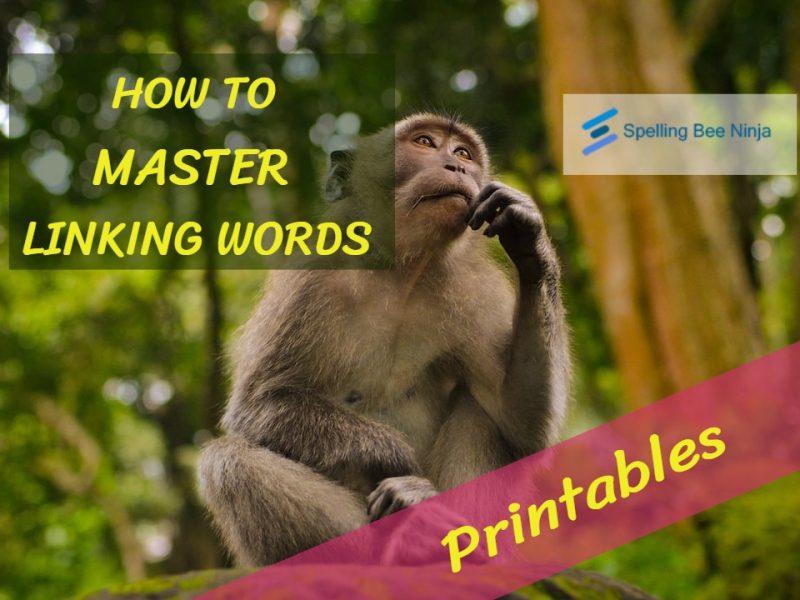Just like their name, linking words are used to connect the previous ideas, sentences, clauses, phrases, or words with the next ones. The linking words might show a contrast, comparison, condition, purpose, and more. Hence there is cohesion between each sentence, and they create meaning or make sense as a whole.
The linking words in English are required in formal and non-formal contexts such as casual daily conversation and even academic writing. This is one of the important aspects that all EFL learners must understand. The examples along with their function and ways to learn them are presented below.
Examples of linking words
There are many examples of linking words. They can be categorized based on these.
Non-formal and formal contexts
In non-formal contexts whether written or spoken, there is less restriction in using linkers. They basically are used to connect ideas without grammar rules. The examples include honestly, I mean, besides, in any case, besides, like, but, so, and then, because, and many more. People could add them in various positions of a sentence as long as they make sense.
On the contrary, linking words in English for formal contexts including writing require more rules. The position is more strictly regulated by grammar rules. Compared to the non-formal ones, linkers in formal contexts have more examples and uses. Some of them are hence, however, furthermore, consequently, nonetheless, and others.
Positions
There are three possible positions for linking words to occur. The most common one is at the beginning of a sentence. Then, in the middle of a sentence or between two clauses also common. The last one is at the end of a sentence, however not all linking words can be grammatically correct for this position. The examples and further explanation are presented in the following points.
- At the beginning of a sentence: usually used for sequencing or also for expressing the writer’s opinions. Examples: first, in conclusion, however, moreover, in other terms, additionally, whereas, and more.
- In the middle of a sentence (between independent clauses): independent clauses are clauses that can stand and make sense on their own. The linkers for this position are specifically called conjunctions. There are only seven of them including for, and, nor, but, or, yet, so.
- In the middle of a sentence (between dependent and independent clauses): unlike independent clauses, a dependent clause cannot stand on its own and must follow/be followed by an independent clause. To connect them, people usually use: after, then, as though, when, as long as, even though, until, because, so that, lest, and more.
- At the end of a sentence: a sentence ended with a linking word is a rare sentence pattern in English, so there is only limited linking words for this position. The examples include however, though, too.
Meanings
There are dozens of linking words in English and each has its usage or meaning. Many of them have similar meanings; categorized by the meanings, here are the examples.
- Additional information/ideas/comments: and, also, furthermore, moreover, in addition, additionally, as well as, what is more, again, besides, regarding, too, then, similarly.
- Causes: because, to cause, because of, since, as, as a result of, for
- Comparisons: similarly, similar to, compared with, likewise, equally, in the same way, not only … but also, the same as, be alike, like, just as.
- Concession: though, even though, although, in spite of, despite, instead, alternatively, whereas.
- Conclusions/summary: in conclusion, to conclude, to sum up, to summarize, overall.
- Contrasts: but, yet, however, on the contrary, in/by contrast, nevertheless, nonetheless, on the other hand.
- Emphasises: indeed, obviously, particularly, undoubtedly, especially, clearly,
- Examples: such as, for example, e.g., for instance, namely, as follow, mainly, including.
- Facts: as a matter of fact, factually, actually, in fact.
- Generalisation: generally, in general, on the whole.
- Re-statements: in other terms, or, rather, in view of this.
- Results: therefore, as a result, thus, hence.
- Sequences: first, next, finally, subsequently, eventually, lastly, another …, secondly, thirdly(and more).
Linking words printable table
Linking Words
| ACTUALLY | FOR | ON THE CONTRARY |
| ADDITIONALLY | FOR EXAMPLE | ON THE OTHER HAND |
| AFTER | FOR INSTANCE | ON THE WHOLE |
| AGAIN | FURTHERMORE | OR |
| ALSO | GENERALLY | OVERALL |
| ALTERNATIVELY | HENCE | PARTICULARLY |
| ALTHOUGH | HOWEVER | RATHER |
| AND | IN ADDITION | REGARDING |
| ANOTHER | IN CONCLUSION | SECONDLY |
| AS | IN FACT | SIMILAR TO |
| AS A MATTER OF FACT | IN GENERAL | SIMILARLY |
| AS A RESULT | IN OTHER TERMS | SINCE |
| AS A RESULT OF | IN SPITE OF | SO |
| AS FOLLOW | IN THE SAME WAY | SO THAT |
| AS LONG AS | IN VIEW OF THIS | SUBSEQUENTLY |
| AS THOUGH | IN/BY CONTRAST | SUCH AS |
| AS WELL AS | INCLUDING | THE SAME AS |
| BE ALIKE | INDEED | THEN |
| BECAUSE | INSTEAD | THEREFORE |
| BECAUSE OF | JUST AS | THIRDLY |
| BESIDES | LASTLY | THOUGH |
| BUT | LEST | THUS |
| BUT ALSO | LIKE | TO CAUSE |
| CLEARLY | LIKEWISE | TO CONCLUDE |
| COMPARED WITH | MAINLY | TO SUM UP |
| DESPITE | MOREOVER | TO SUMMARIZE |
| EQUALLY | NAMELY | TOO |
| ESPECIALLY | NEVERTHELESS | UNDOUBTEDLY |
| EVEN THOUGH | NEXT | UNTIL |
| EVENTUALLY | NONETHELESS | WHAT IS MORE |
| FACTUALLY | NOR | WHEN |
| FINALLY | NOT ONLY | WHEREAS |
| FIRST | OBVIOUSLY | YET |
Linking words: PDF, Flashcards and SBN formats
 | > Linking words in PDF Format |
 | > Linking words FLASHCARDS in PDF Format |
 | > Linking Transition words with our SBN APP |
How to learn linking words in English
Explicitly
Congratulations! You have just learned the linking words explicitly. Learning them explicitly means that you read the explanations along with the words’ examples without any contexts in a sentence or text which you have done after reading the previous explanation. You may notice and remember some of the words including the usage or context. However, learners tend to forget the words that should lead to further learning: implicitly.
Implicitly
Learning linking words in English implicitly requires lots of correct examples. You can find them in sentences, conversations, or texts. Therefore, you can see how each linking word is used in a sentence. You will learn ‘unconsciously’ the pattern or how to use the linking words based on the context or meaning. It will be better to learn the words explicitly first and then be followed by learning them implicitly through examples. So you can better and faster at noticing the linking words.
Another important aspect to consider carefully when you learn the words implicitly is the source of the examples. The sentences, dialogues, or texts that you use should be correct grammatically, natural, and acceptable in English. Otherwise, you will get misled and produce the wrong sentences.
- ✈️ How to Use Articles in English
- 🐝 Mastering Adjectives: A Key to Enhancing Your Writing Skills
- 🎮 Pronoun Puzzle: A Fun Way to Practice Personal and Possessive Forms
- 🎮 Adjective Adventure: Descriptive Word Search!
- ✈️ How to use prepositions in English
- ✈️ English Adverbs – 5 Quick and Easy ways to learn.
- The definitive pronouns list
- 🐝 Understanding conjunction words and where to use them
- ✈️ Modal Verbs in English: A Comprehensive Guide
- 🐝 Prepositions list – The definitive guide
- ✈️ Active and Passive Voice
- ✈️ What vs Which: differences and examples
- 🐝 Complete transition words list
- ✈️ How to Use Punctuation in English
- ✈️ Exploring the Difference Between “Will” and “Shall” in English
- ✈️ The Difference Between Could, Should, and Ought in English
- ✈️ Common Idiomatic Expressions in English
- ✈️ 40 English Prefixes and their meanings
- ✈️ 30 Most common English suffixes and their meaning.
- 🐝 Linking Words In English And How To Learn Them Effectively
- ✈️ Comparative and Superlative Adjectives
- ✈️ The Six Noun Types (Common, Proper, Countable, Uncountable, Collective, Abstract)
- ✈️ Understanding English Clauses: A Complete Guide
- ✈️ Understanding Sentence Structure in English
- ✈️ Gerunds and Infinitives: Understanding Verb Complements in English
- ✈️ Common Pronunciation Mistakes and How to Fix Them
- ✈️ Question Formation in English
- ✈️ Common Sentence Errors: Fragments, Run-ons, and Misplaced Modifiers
- ✈️ Say What?! A Fun Guide to Direct and Indirect Speech
- ✈️ Commonly Confused Words
- 🐝 ELA vocabulary: Essential English Language Arts Terms Every Student Should Know
- ✈️ Formal vs. Informal Language
- ✈️ Mastering Phrases in English Grammar
- ✈️ Conditionals (Zero, First, Second, Third, Mixed Conditionals)
- ✈️ Emphasis and Inversion in Sentences
- ✈️ Understanding and Using the Imperative Form


